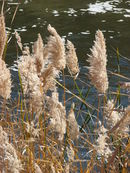Biological Invasions (2013) 15, 1725-1737
From Pestinfo-Wiki
 | Selected publication you are invited to contribute to the discussion section (above tab) |
Impacts of plant invasions can be reversed through restoration: a regional meta-analysis of faunal communities
Biological Invasions 15 (8), 1725-1737
Abstract: We quantified the effects of invasive Phragmites australis on estuarine faunal communities using meta-analysis to compare invaded to uninvaded marshes and then evaluated whether ecological restoration could reverse those effects. Relative to uninvaded marshes, the quantity and condition of fauna in invaded marshes was significantly poorer. We detected negative impacts to fauna residing in the mid-Atlantic but not in New England and to fauna utilizing the marsh surface but not to those inhabiting tidal creeks. By taxonomic group, we found that the invasion negatively affected nekton but not invertebrates. Both adult and sub-adult nekton were adversely affected, although the magnitude of the effect on the sub-adults was four times greater than that for adults. Our results indicate that negative effects on fauna within the mid-Atlantic region largely drove the overall results. When restored marshes were compared to uninvaded marshes there were no significant differences across all metrics assessed, suggesting that the negative impacts of the invasion were reversed. A separate qualitative review of trophic data indicated that benthic microalgae and dominant vascular plants are important primary producers at the base of the food web in uninvaded, invaded, and restored salt marshes but the overall quantity and importance of microalgae to diet decreased in highly invaded systems due to decreased light, potentially reducing energy availability. Our analyses revealed that while estuarine communities are adversely affected by P. australis, impacts vary by region, habitat, taxonomic group, and life history stage and that restoration can reverse long-term effects over relatively short time scales.
(The abstract is excluded from the Creative Commons licence and has been copied with permission by the publisher.)
Link to article at publishers website
Database assignments for author(s): Laura A. Meyerson
Research topic(s) for pests/diseases/weeds:
environment - cropping system/rotation
damage/losses/economics
Pest and/or beneficial records:
| Beneficial | Pest/Disease/Weed | Crop/Product | Country | Quarant. |
|---|---|---|---|---|
| Phragmites australis (weed) | U.S.A. (NE) |